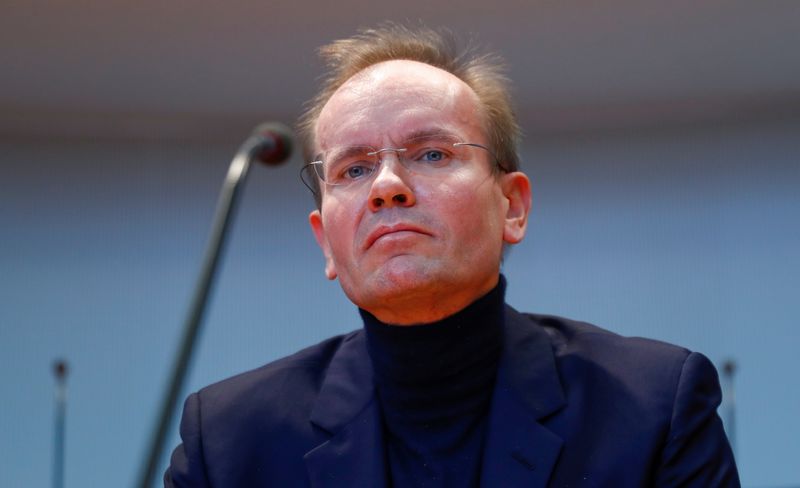(Reuters) - Payments company Wirecard collapsed in 2020 in Germany's biggest post-war fraud scandal. A trial will start in Munich on Thursday, with former Chief Executive Markus Braun facing charges. Braun denies wrongdoing.
The following timeline summarises the developments that led to the collapse of the company, as well as key moments since:
1999: Wirecard is founded in Munich.
2002: Markus Braun, previously a KPMG consultant, takes over as chief executive.
2005: Wirecard is listed on the Deutsche Boerse (ETR:DB1Gn) Frankfurt (Frankfurt Stock Exchange), Prime Standard segment.
2006: Consolidation of Wirecard Bank AG.
2007: Wirecard Asia Pacific established.
2010: Jan Marsalek appointed Chief Operating Officer at Wirecard.
2016: A negative report by short sellers Zatarra Research alleges fraudulent activity at Wirecard, claiming that senior executives have committed money laundering offences, as well as defrauding Mastercard (NYSE:MA) and Visa (NYSE:V).
2018: Wirecard joins the DAX blue-chip market index, making it officially one of the 30 most valuable German companies listed on the Frankfurt Stock Exchange.
2019
Jan. 30: Wirecard denies a report in the Financial Times that a company's executive had used forged and backdated contracts in a string of suspicious transactions that raised questions about the integrity of the company's accounting practice.
Feb. 19: BaFin informs the finance ministry that it has ordered an inquiry into Wirecard's accounting, and is banning short-selling in the company's stock.
March 28: Wirecard sues the FT over a series of investigative reports that it said made use of, and misrepresented, business secrets.
Oct. 21: The company hires KPMG to conduct an independent audit to address allegations by the FT that its finance team had sought to inflate reported sales and profits.
2020
Apr. 28: An independent investigation by auditor KPMG finds that Wirecard did not provide sufficient documentation to address all allegations of accounting irregularities made by the Financial Times.
May 25: Publication of final 2019 results is postponed for a third time.
June 18: Auditor EY refuses to sign off Wirecard's 2019 accounts as it was unable to confirm the existence of 1.9 billion euros ($1.99 billion) in cash balances on trust accounts, representing around a quarter of its balance sheet.
June 19: Wirecard's CEO Markus Braun quits as firm's search for missing cash hits a dead end in the Philippines and it scrambles to secure a financial lifeline from its banks.
June 22: Wirecard says that the 1.9 billion euros it booked in its accounts likely never existed.
June 22: The finance ministry examines giving Wirecard loan from state bank KfW, documents seen by Reuters show.
June 23: Wirecard's former boss Braun is released on bail after being arrested on suspicion of falsifying the company's accounts.
June 25: Wirecard files for insolvency, owing creditors almost $4 billion after disclosing a gaping hole in its books.
June 29: A Munich court appoints Michael Jaffe to manage the insolvency of Wirecard.
July 1: Police and public prosecutors raid Wirecard's headquarters in Munich and four properties in German and Austria as they widen their investigation into the company.
July 2: The head of Germany's financial watchdog calls the accounting scandal at Wirecard "a massive criminal act".
July 6: German prosecutors arrest the head of a Dubai-based subsidiary of Wirecard.
July 9: German state prosecutors start investigating individuals at Wirecard for suspected money laundering.
July 16: The former head of a Dubai-based subsidiary of Wirecard admits wrongdoing to prosecutors for his role in a multi-billion-euro fraud.
July 22: German prosecutors arrest three former top executives of Wirecard, including Braun, saying they suspected them of masterminding a criminal racket to fake the company's accounts and defraud creditors of billions of euros.
Sept. 1: German lawmakers launch a parliamentary inquiry into Wirecard.
2021
Jan. 29: Felix Hufeld, president of German financial watchdog BaFin, steps down.
Feb. 2: Olaf Scholz, then German finance minister and vice-chancellor, announces he is giving BaFin more powers to spot and investigate misconduct at companies it supervises.
Feb. 24: The head of Germany's accounting watchdog steps down.
April 22: Scholz denies any responsibility for the Wirecard fraud.
April 23: Then chancellor Angela Merkel rejects criticism of her lobbying for Wirecard in China months before it collapsed, saying she had no reason to suspect the firm of criminality.
June 5: Authorities in the Philippines plan to sue some Wirecard executives.
2022
Jan. 14: German prosecutors file first charges in Wirecard fraud, the Financial Times reports.

Sept. 21: A Munich district court said it had admitted charges against former Wirecard executives, paving way for a trial.
($1 = 0.9530 euros)